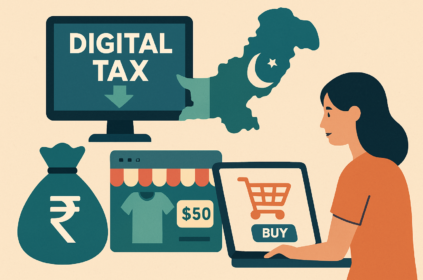In a bold move to strengthen its position in global trade negotiations, Pakistan has withdrawn its recently introduced 5% digital tax on foreign technology companies and digital platforms supplying goods and services within the country. This decision, effective retroactively from July 1, 2025, was announced by the Federal Board of Revenue (FBR) on Wednesday, aligning with Finance Minister Muhammad Aurangzeb’s visit to Washington for critical trade discussions. The repeal of the Digital Presence Proceeds Tax Act, introduced as part of the fiscal year 2025–26 budget, has sparked widespread discussion about its implications for Pakistan’s digital economy, trade relations, and fiscal stability.
This blog delves into the reasons behind the tax repeal, its impact on foreign tech firms, and how Pakistan is navigating the delicate balance between fostering economic growth and maintaining fiscal discipline. Whether you’re a tech enthusiast, an investor, or simply curious about Pakistan’s economic strategies, this post offers a comprehensive look at this pivotal policy shift.
Why Was the Digital Tax Introduced?
The 5% digital tax was initially implemented to address a long-standing issue in Pakistan’s tax framework: the inability to tax cross-border digital transactions due to the absence of a permanent physical presence by foreign vendors. As Pakistan’s digital economy has grown, so has the volume of digitally delivered goods and services, including:
- Online advertising (e.g., Google Ads, Meta Ads)
- Software and cloud storage (e.g., Microsoft Azure, AWS)
- Streaming services (e.g., Netflix, Spotify)
- Remote education and healthcare (e.g., online courses, telemedicine)
- Banking and consulting services delivered electronically
These services, often automated or involving minimal human interaction, had previously escaped taxation, resulting in significant revenue losses for the government. The Digital Presence Proceeds Tax Act aimed to capture this untapped revenue stream by imposing a 5% tax on non-resident entities providing digital services to Pakistani consumers.
To enforce the tax, the FBR mandated that banks and payment intermediaries deduct and report taxes on digital payments made to offshore vendors. These institutions were also required to submit quarterly reports detailing the revenue generated through international digital commerce. This approach was designed to streamline tax collection and ensure compliance in an increasingly digital world.
The Decision to Scrap the Digital Tax
Aligning with Trade Negotiations
The decision to repeal the 5% digital tax comes at a critical juncture for Pakistan, as the country seeks to finalize a bilateral trade deal with key international partners. The tax, which had only been in effect for a few weeks, created friction with foreign tech companies and raised concerns about its impact on Pakistan’s attractiveness as a destination for foreign investment. By scrapping the tax, Pakistan aims to:
- Ease tensions with global tech giants and digital platforms
- Unlock progress in ongoing trade negotiations
- Signal flexibility in its economic policies to foster international cooperation
The timing of the announcement, coinciding with Finance Minister Muhammad Aurangzeb’s visit to Washington, underscores the strategic nature of this decision. According to reports from The Express Tribune, the repeal is part of a broader effort to strengthen Pakistan’s commercial positioning on the global stage.
Retroactive Exemption and Fiscal Implications
The FBR’s official notification confirms that the tax exemption applies to all non-resident entities and is retroactive from July 1, 2025, the date the tax law took effect. This means that any taxes collected during the brief period the law was in force will likely need to be refunded or adjusted, adding complexity to the FBR’s operations.
However, this move is not without its challenges. The tax repeal is expected to result in a significant revenue shortfall, potentially amounting to billions of rupees. Finance Ministry sources have indicated that discussions are underway to mitigate the fiscal impact of this decision and ensure it aligns with Pakistan’s macroeconomic commitments, including those tied to international financial agreements.
Impact on Pakistan’s Digital Economy
Benefits for Foreign Tech Firms
The repeal of the 5% digital tax is a major win for foreign tech companies operating in Pakistan. By removing the tax burden, Pakistan has made it more cost-effective for these firms to provide services such as:
- Cloud computing and storage solutions
- Streaming platforms for video and audio content
- Online advertising and marketing services
- Remote professional services, including consulting and education
This decision is likely to encourage greater investment from global tech giants, fostering innovation and improving access to digital services for Pakistani consumers. It also reduces the risk of price increases that could have been passed on to end-users as a result of the tax.
Challenges for Fiscal Policy
While the tax repeal supports Pakistan’s trade and investment goals, it poses challenges for the country’s fiscal policy. The government must now find alternative revenue sources to offset the loss of billions of rupees in projected tax income. Potential strategies include:
- Optimizing existing tax frameworks to improve compliance
- Exploring new revenue streams within the domestic economy
- Leveraging international aid or loans to bridge the fiscal gap
The Finance Ministry is reportedly working on a plan to manage these challenges without compromising Pakistan’s commitments to fiscal discipline and economic stability.
Balancing Investor Confidence and Digital Sector Stability
The decision to scrap the digital tax reflects Pakistan’s broader strategy to maintain investor confidence and protect access to digital services. As the global economy becomes increasingly digitized, access to affordable and reliable digital platforms is critical for both consumers and businesses. By removing the tax, Pakistan is positioning itself as a competitive player in the global digital economy, encouraging foreign companies to continue operating in the country without the added financial burden.
Moreover, the repeal supports Pakistan’s long-term commercial positioning. By demonstrating flexibility in its tax policies, the government is signaling its commitment to fostering a business-friendly environment. This is particularly important as Pakistan seeks to attract foreign direct investment (FDI) and strengthen its trade relations with key partners.
What’s Next for Pakistan’s Digital Tax Policy?
As trade negotiations continue, the rollback of the 5% digital tax highlights Pakistan’s willingness to adapt its policies to align with global economic trends. However, the government faces the challenge of balancing fiscal discipline with the need to remain competitive in the digital economy. Moving forward, policymakers will need to:
- Develop alternative revenue strategies to offset the fiscal shortfall
- Engage with stakeholders in the tech industry to ensure sustainable growth
- Monitor the impact of the tax repeal on trade negotiations and investor confidence
The success of this policy shift will depend on Pakistan’s ability to navigate these challenges while maintaining its commitment to economic growth and stability.
Conclusion: A Strategic Pivot for Pakistan’s Economy
Pakistan’s decision to repeal the 5% digital tax on foreign tech firms is a strategic move aimed at strengthening trade relations, fostering investor confidence, and supporting the growth of the digital economy. While the move comes at the cost of a significant revenue shortfall, it underscores Pakistan’s commitment to adaptability and cooperation in a rapidly evolving global market. As the country continues to navigate its trade negotiations and fiscal challenges, the repeal serves as a reminder of the delicate balance between economic growth and fiscal responsibility.















